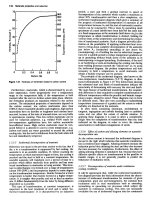IC legal reference book
Bạn đang xem bản rút gọn của tài liệu. Xem và tải ngay bản đầy đủ của tài liệu tại đây (2.74 MB, 688 trang )
UNCLASSIFIED
Office of the Director
of National Intelligence
Office of General Counsel
Intelligence Community
Legal Reference Book
Office of the Director of National Intelligence
Washington, DC 20511
UNCLASSIFIED
UNCLASSIFIED
Intelligence Community
Legal Reference Book
Office of the Director
of National Intelligence
Office of General Counsel
F a l l
UNCLASSIFIED
UNCLASSIFIED
2 0 0 7
UNCLASSIFIED
INTELLIGENCE COMMUNITY
LEGAL REFERENCE BOOK
OFFICE OF THE DIRECTOR OF NATIONAL INTELLIGENCE
OFFICE OF GENERAL COUNSEL
FALL 2007
ii
INTRODUCTION
On behalf of the Director of National Intelligence, I am pleased to make
available the Fall 2007 Intelligence Community Legal Reference Book.
The Intelligence Community draws much of its authority and guidance from
the body of law in this collection. As the Director of National Intelligence seeks
to better integrate the Intelligence Community, we hope this proves to be a useful
resource to intelligence professionals across the Community.
This document is the result of many hours of hard work. I would like to
extend my thanks to those across the Community who assisted the Office of
General Counsel in recommending and preparing the authorities contained
herein. I hope you find this book a valuable addition to your library and a useful
tool as you carry out your vital mission.
BENJAMIN A. POWELL
GENERAL COUNSEL
FALL 2007
iii
iv
ABOUT THIS BOOK
The documents presented in this book have been updated to incorporate all
amendments made through August 2007, at which point the documents were,
where possible, verified against the United States Code maintained by Westlaw.
The text of these documents should be cited as “as amended.”
All documents in this book are UNCLASSIFIED.
This compilation was a significant effort and required many judgments
concerning what text to include and how to organize the book. We welcome
your thoughts for improving future versions. To request additional copies or an
electronic version of this book, please contact the ODNI Office of General
Counsel.
The following materials were reprinted with the permission of Westlaw:
Department of Defense Title 10 Authorities
Classified Information Procedures Act
Privacy Act
Federal Information Security Management Act
v
vi
TABLE OF CONTENTS
NATIONAL SECURITY ACT OF 1947 .................................................................................... 1
INTELLIGENCE REFORM AND TERRORISM PREVENTION ACT OF 2004* .......................... 115
CENTRAL INTELLIGENCE AGENCY ACT OF 1949 ............................................................ 167
DEPARTMENT OF DEFENSE TITLE 10 AUTHORITIES ........................................................ 205
HOMELAND SECURITY ACT OF 2002* ............................................................................ 215
COUNTERINTELLIGENCE AND SECURITY ENHANCEMENTS ACT OF 1994 ........................ 273
COUNTERINTELLIGENCE ENHANCEMENT ACT OF 2002 .................................................. 277
CLASSIFIED INFORMATION PROCEDURES ACT ................................................................ 283
FOREIGN INTELLIGENCE SURVEILLANCE ACT OF 1978................................................... 293
PROTECT AMERICA ACT OF 2007 ................................................................................... 347
USA PATRIOT ACT OF 2001* ...................................................................................... 355
USA PATRIOT IMPROVEMENT AND REAUTHORIZATION ACT OF 2005* ....................... 391
DETAINEE TREATMENT ACT OF 2005 ............................................................................. 425
MILITARY COMMISSIONS ACT OF 2006 .......................................................................... 433
FREEDOM OF INFORMATION ACT .................................................................................... 481
PRIVACY ACT ................................................................................................................. 495
FEDERAL INFORMATION SECURITY MANAGEMENT ACT ................................................ 515
EXECUTIVE ORDER 12333 .............................................................................................. 533
EXECUTIVE ORDER 12863 .............................................................................................. 553
EXECUTIVE ORDER 12958 .............................................................................................. 557
EXECUTIVE ORDER 12968 .............................................................................................. 585
EXECUTIVE ORDER 13354 .............................................................................................. 599
EXECUTIVE ORDER 13355 .............................................................................................. 605
EXECUTIVE ORDER 13381 .............................................................................................. 613
EXECUTIVE ORDER 13388 .............................................................................................. 617
INTELLIGENCE SHARING PROCEDURES FOR FOREIGN INTELLIGENCE AND FOREIGN
COUNTERINTELLIGENCE INVESTIGATIONS CONDUCTED BY THE FBI.............................. 621
GUIDELINES FOR DISCLOSURE OF GRAND JURY AND ELECTRONIC, WIRE, AND ORAL
INTERCEPTION INFORMATION IDENTIFYING UNITED STATES PERSONS .......................... 627
GUIDELINES REGARDING DISCLOSURE TO THE DIRECTOR OF CENTRAL INTELLIGENCE AND
HOMELAND SECURITY OFFICIALS OF FOREIGN INTELLIGENCE ACQUIRED IN THE COURSE
OF A CRIMINAL INVESTIGATION ..................................................................................... 631
GUIDELINES REGARDING PROMPT HANDLING OF REPORTS OF POSSIBLE CRIMINAL
ACTIVITY INVOLVING FOREIGN INTELLIGENCE SOURCES .............................................. 641
STRENGTHENING INFORMATION SHARING, ACCESS, AND INTEGRATION B
ORGANIZATIONAL, MANAGEMENT, AND POLICY DEVELOPMENT STRUCTURES FOR
CREATING THE TERRORISM INFORMATION SHARING ENVIRONMENT ............................. 645
GUIDELINES AND REQUIREMENTS IN SUPPORT OF THE INFORMATION SHARING
ENVIRONMENT ............................................................................................................... 649
GUIDELINES TO ENSURE THAT THE INFORMATION PRIVACY AND OTHER LEGAL RIGHTS OF
AMERICANS ARE PROTECTED IN THE DEVELOPMENT AND USE OF THE INFORMATION
SHARING ENVIRONMENT ................................................................................................ 659
MOU: REPORTING OF INFORMATION CONCERNING FEDERAL CRIMES ........................... 667
* Selected Provisions of these documents are presented in this book.
vii
viii
NATIONAL SECURITY ACT OF 1947
NATIONAL SECURITY ACT OF 1947
(Public Law 235 of July 26, 1947; 61 STAT. 496)
AN ACT To promote the national security by providing for a Secretary of
Defense; for a National Military Establishment; for a Department of the Army, a
Department of the Navy, and a Department of the Air Force; and for the
coordination of the activities of the National Military Establishment with other
departments and agencies of the Government concerned with the national
security.
Be it enacted by the Senate and House of Representatives of the United States of
America in Congress assembled,
SHORT TITLE
That this Act may be cited as the “National Security Act of 1947”.
TABLE OF CONTENTS
SEC. 2.
SEC. 3.
SEC. 101.
SEC. 101A.
SEC. 102.
SEC. 102A.
SEC. 103.
SEC. 103A.
SEC. 103B.
SEC. 103C.
SEC. 103D.
SEC. 103E.
SEC. 103F.
SEC. 103G.
SEC. 104.
SEC. 104A.
SEC. 105.
SEC. 105A.
SEC. 105B.
SEC. 106.
Declaration of policy.
Definitions.
TITLE I—COORDINATION FOR NATIONAL SECURITY
National Security Council.
Joint Intelligence Community Council.
Director of National Intelligence.
Responsibilities and authorities of the Director of National Intelligence.
Office of the Director of National Intelligence.
Deputy Directors of National Intelligence.
National Intelligence Council.
General Counsel.
Civil Liberties Protection Officer.
Director of Science and Technology.
National Counterintelligence Executive.
Chief Information Officer.
Central Intelligence Agency.
Director of the Central Intelligence Agency.
Responsibilities of the Secretary of Defense pertaining to the National
Intelligence Program.
Assistance to United States law enforcement agencies.
Disclosure of foreign intelligence acquired in criminal investigations;
notice of criminal investigations of foreign intelligence sources.
Appointment of officials responsible for intelligence-related activities.
1
NATIONAL SECURITY ACT OF 1947
SEC. 107.
SEC. 108.
SEC. 109.
SEC. 110.
SEC. 112.
SEC. 113.
Sec. 117.
SEC. 118.
SEC. 119.
SEC. 119A.
SEC. 119B.
National Security Resources Board.
Annual National Security Strategy Report.
Annual report on intelligence.
National mission of National Geospatial-Intelligence Agency.
Restrictions on intelligence sharing with the United Nations.
Detail of intelligence community personnel—intelligence community
assignment program.
Additional annual reports from the Director of National Intelligence.
Annual report on improvement of financial statements for auditing
purposes.
Limitation on establishment or operation of diplomatic intelligence
support centers.
Travel on any common carrier for certain intelligence collection
personnel.
POW/MIA analytic capability.
Semiannual report on financial intelligence on terrorist assets.
National Counterterrorism Center.
National Counterproliferation Center.
National intelligence centers.
SEC. 201.
SEC. 205.
SEC. 206.
SEC. 207.
TITLE II—THE DEPARTMENT OF DEFENSE
Department of Defense.
Department of the Army.
Department of the Navy.
Department of the Air Force.
SEC. 114.
SEC. 114A.
SEC. 115.
SEC. 116.
SEC. 301.
SEC. 302.
SEC. 303.
SEC. 307.
SEC. 308.
SEC. 309.
SEC. 310.
SEC. 311.
SEC. 411.
SEC. 501.
SEC. 502.
SEC. 503.
SEC. 504.
SEC. 505.
TITLE III—MISCELLANEOUS
National Security Agency voluntary separation.
Authority of Federal Bureau of Investigation to award personal services
contracts.
Advisory committees and personnel.
Authorization for appropriations.
Definitions.
Separabillity.
Effective date.
Succession to the Presidency.
Repealing and saving provisions.
TITLE V—ACCOUNTABILITY FOR INTELLIGENCE ACTIVITIES
General congressional oversight provisions.
Reporting of intelligence activities other than covert actions.
Presidential approval and reporting of covert actions.
Funding of intelligence activities.
Notice to Congress of certain transfers of defense articles and defense
services.
2
NATIONAL SECURITY ACT OF 1947
SEC. 506.
SEC. 506A.
SEC. 507.
Specificity of National Intelligence Program budget amounts for
counterterrorism, counterproliferation, counternarcotics, and
counterintelligence.
Budget treatment of costs of acquisition of major systems by the
intelligence community.
Dates for submittal of various annual and semiannual reports to the
congressional intelligence committees.
TITLE VI—PROTECTION OF CERTAIN NATIONAL SECURITY INFORMATION
Protection of identities of certain United States undercover intelligence
SEC. 601.
officers, agents, informants, and sources.
Defenses and exceptions.
SEC. 602.
Extraterritorial jurisdiction.
SEC. 604.
Providing information to Congress.
SEC. 605.
Definitions.
SEC. 606.
SEC. 701.
SEC. 702.
SEC. 703.
SEC. 704.
SEC. 705.
TITLE VII—PROTECTION OF OPERATIONAL FILES
Operational files of the Central Intelligence Agency.
Operational files of the National Geospatial-Intelligence Agency.
Operational files of the National Reconnaissance Office.
Operational files of the National Security Agency.
Operational files of the Defense Intelligence Agency.
SEC. 801.
SEC. 802.
SEC. 803.
SEC. 804.
TITLE VIII—ACCESS TO CLASSIFIED INFORMATION
Procedures.
Requests by authorized investigative agencies.
Exceptions.
Definitions.
TITLE IX—APPLICATION OF SANCTIONS LAWS TO INTELLIGENCE ACTIVITIES
Stay of sanctions.
SEC. 901.
Extension of stay.
SEC. 902.
Reports.
SEC. 903.
Laws subject to stay.
SEC. 904.
TITLE X—EDUCATION IN SUPPORT OF NATIONAL INTELLIGENCE
SEC. 1001.
SEC. 1002.
SEC. 1003.
SEC. 1011.
SUBTITLE A—SCIENCE AND TECHNOLOGY
Scholarships and work-study for pursuit of graduate degrees in science
and technology.
Framework for cross-disciplinary education and training.
Intelligence Community Scholarship Program.
SUBTITLE B—FOREIGN LANGUAGES PROGRAM
Program on advancement of foreign languages critical to the
intelligence community.
3
NATIONAL SECURITY ACT OF 1947
SEC. 1012.
SEC. 1013.
SEC. 1014.
SEC. 1015.
Education partnerships.
Voluntary services.
Regulations.
Definitions.
SEC. 1021.
SUBTITLE C—ADDITIONAL EDUCATION PROVISIONS
Assignment of intelligence community personnel as language students.
SEC. 1101.
SEC. 1102.
TITLE XI—OTHER PROVISIONS
Applicability to United States intelligence activities of Federal laws
implementing international treaties and agreements.
Counterintelligence initiatives.
DECLARATION OF POLICY
SEC. 2. [50 U.S.C. §401]
In enacting this legislation, it is the intent of Congress to provide a
comprehensive program for the future security of the United States; to provide
for the establishment of integrated policies and procedures for the departments,
agencies, and functions of the Government relating to the national security; to
provide a Department of Defense, including the three military Departments of the
Army, the Navy (including naval aviation and the United States Marine Corps),
and the Air Force under the direction, authority, and control of the Secretary of
Defense; to provide that each military department shall be separately organized
under its own Secretary and shall function under the direction, authority, and
control of the Secretary of Defense; to provide for their unified direction under
civilian control of the Secretary of Defense but not to merge these departments or
services; to provide for the establishment of unified or specified combatant
commands, and a clear and direct line of command to such commands; to
eliminate unnecessary duplication in the Department of Defense, and particularly
in the field of research and engineering by vesting its overall direction and
control in the Secretary of Defense; to provide more effective, efficient, and
economical administration in the Department of Defense; to provide for the
unified strategic direction of the combatant forces, for their operation under
unified command, and for their integration into an efficient team of land, naval,
and air forces but not to establish a single Chief of Staff over the armed forces
nor an overall armed forces general staff.
4
NATIONAL SECURITY ACT OF 1947
DEFINITIONS
SEC. 3. [50 U.S.C. §401a]
As used in this Act:
(1) The term “intelligence” includes foreign intelligence and counterintelligence.
(2) The term “foreign intelligence” means information relating to the capabilities,
intentions, or activities of foreign governments or elements thereof, foreign
organizations, or foreign persons, or international terrorist activities.
(3) The term “counterintelligence” means information gathered and activities
conducted to protect against espionage, other intelligence activities, sabotage, or
assassinations conducted by or on behalf of foreign governments or elements
thereof, foreign organizations, or foreign persons, or international terrorist
activities.
(4) The term “intelligence community” includes the following:
(A) The Office of the Director of National Intelligence.
(B) The Central Intelligence Agency.
(C) The National Security Agency.
(D) The Defense Intelligence Agency.
(E) The National Geospatial-Intelligence Agency.
(F) The National Reconnaissance Office.
(G) Other offices within the Department of Defense for the collection of
specialized national intelligence through reconnaissance programs.
(H) The intelligence elements of the Army, the Navy, the Air Force, the
Marine Corps, the Federal Bureau of Investigation, and the Department
of Energy.
(I) The Bureau of Intelligence and Research of the Department of State.
(J) The Office of Intelligence and Analysis of the Department of the
Treasury.
(K) The elements of the Department of Homeland Security concerned
with the analysis of intelligence information, including the Office of
Intelligence of the Coast Guard.
(L) Such other elements of any other department or agency as may be
designated by the President, or designated jointly by the Director of
National Intelligence and the head of the department or agency
concerned, as an element of the intelligence community.
(5) The terms “national intelligence” and “intelligence related to national
security” refer to all intelligence, regardless of the source from which derived
and including information gathered within or outside the United States, that—
(A) pertains, as determined consistent with any guidance issued by the
President, to more than one United States Government agency; and
(B) that involves—
(i) threats to the United States, its people, property, or interests;
5
NATIONAL SECURITY ACT OF 1947
(ii) the development, proliferation, or use of weapons of mass
destruction; or
(iii) any other matter bearing on United States national or
homeland security.
(6) The term “National Intelligence Program” refers to all programs, projects,
and activities of the intelligence community, as well as any other programs of the
intelligence community designated jointly by the Director of National
Intelligence and the head of a United States department or agency or by the
President. Such term does not include programs, projects, or activities of the
military departments to acquire intelligence solely for the planning and conduct
of tactical military operations by United States Armed Forces.
(7) The term “congressional intelligence committees”
means—
(A) the Select Committee on Intelligence of the Senate; and
(B) the Permanent Select Committee on Intelligence of the House of
Representatives.
TITLE I—COORDINATION FOR NATIONAL SECURITY
NATIONAL SECURITY COUNCIL
SEC. 101. [50 U.S.C. §402]
(a) There is here established a council to be known as the National Security
Council (thereinafter in this section referred to as the “Council”). The President
of the United States shall preside over meetings of the Council: Provided, That in
his absence he may designate a member of the Council to preside in his place.
The function of the Council shall be to advise the President with respect to the
integration of domestic, foreign, and military policies relating to the national
security so as to enable the military services and the other departments and
agencies of the Government to cooperate more effectively in matters involving
the national security.
The Council shall be composed of—
(1) the President;
(2) the Vice President;
(3) the Secretary of State;
(4) the Secretary of Defense;
(5) the Director for Mutual Security;
(6) the Chairman of the National Security Resources Board; and
(7) the Secretaries and Under Secretaries of other executive departments
and of the military departments, the Chairman of the Munitions Board,
and the Chairman of the Research and Development Board, when
6
NATIONAL SECURITY ACT OF 1947
appointed by the President by and with the advice and consent of the
Senate, to serve at his pleasure.
(b) In addition to performing such other functions as the President may direct,
for the purpose of more effectively coordinating the policies and functions of the
departments and agencies of the Government relating to the national security, it
shall, subject to the direction of the President, be the duty of the Council—
(1) to assess and appraise the objectives, commitments, and risks of the
United States in relation to our actual and potential military power, in the
interest of national security, for the purpose of making recommendations
to the President in connection therewith; and
(2) to consider policies on matters of common interest to the departments
and agencies of the Government concerned with the national security,
and to make recommendations to the President in connection therewith.
(c) The Council shall have a staff to be headed by a civilian executive secretary
who shall be appointed by the President. The executive secretary, subject to the
direction of the Council, is authorized, subject to the civil-service laws and the
Classification Act of 1923, as amended, to appoint and fix the compensation of
such personnel as may be necessary to perform such duties as may be prescribed
by the Council in connection with the performance of its functions.
(d) The Council shall, from time to time, make such recommendations, and such
other reports to the President as it deems appropriate or as the President may
require.
(e) The Chairman (or in his absence the Vice Chairman) of the Joint Chiefs of
Staff may, in his role as principal military adviser to the National Security
Council and subject to the direction of the President, attend and participate in
meetings of the National Security Council.
(f) The Director of National Drug Control Policy may, in the role of the Director
as principal adviser to the National Security Council on national drug control
policy, and subject to the direction of the President, attend and participate in
meetings of the National Security Council.
(g) The President shall establish within the National Security Council a board to
be known as the “Board for Low Intensity Conflict”. The principal function of
the board shall be to coordinate the policies of the United States for low intensity
conflict.
(h)(1) There is established within the National Security Council a committee to
be known as the Committee on Foreign Intelligence (in this subsection referred to
as the “Committee”).
(2) The Committee shall be composed of the following:
(A) The Director of National Intelligence.
(B) The Secretary of State.
(C) The Secretary of Defense.
7
NATIONAL SECURITY ACT OF 1947
(D) The Assistant to the President for National Security Affairs,
who shall serve as the chairperson of the Committee.
(E) Such other members as the President may designate.
(3) The function of the Committee shall be to assist the Council in its
activities by—
(A) identifying the intelligence required to address the national
security interests of the United States as specified by the
President;
(B) establishing priorities (including funding priorities) among
the programs, projects, and activities that address such interests
and requirements; and
(C) establishing policies relating to the conduct of intelligence
activities of the United States, including appropriate roles and
missions for the elements of the intelligence community and
appropriate targets of intelligence collection activities.
(4) In carrying out its function, the Committee shall—
(A) conduct an annual review of the national security interests of
the United States;
(B) identify on an annual basis, and at such other times as the
Council may require, the intelligence required to meet such
interests and establish an order of priority for the collection and
analysis of such intelligence; and
(C) conduct an annual review of the elements of the intelligence
community in order to determine the success of such elements in
collecting, analyzing, and disseminating the intelligence
identified under subparagraph (B).
(5) The Committee shall submit each year to the Council and to the
Director of National Intelligence a comprehensive report on its activities
during the preceding year, including its activities under paragraphs (3)
and (4).
(i)(1) There is established within the National Security Council a committee to be
known as the Committee on Transnational Threats (in this subsection referred to
as the “Committee”).
(2) The Committee shall include the following members:
(A) The Director of National Intelligence.
(B) The Secretary of State.
(C) The Secretary of Defense.
(D) The Attorney General.
(E) The Assistant to the President for National Security Affairs,
who shall serve as the chairperson of the Committee.
(F) Such other members as the President may designate.
8
NATIONAL SECURITY ACT OF 1947
(3) The function of the Committee shall be to coordinate and direct the
activities of the United States Government relating to combating
transnational threats.
(4) In carrying out its function, the Committee shall—
(A) identify transnational threats;
(B) develop strategies to enable the United States Government to
respond to transnational threats identified under subparagraph
(A);
(C) monitor implementation of such strategies;
(D) make recommendations as to appropriate responses to
specific transnational threats;
(E) assist in the resolution of operational and policy differences
among Federal departments and agencies in their responses to
transnational threats;
(F) develop policies and procedures to ensure the effective
sharing of information about transnational threats among Federal
departments and agencies, including law enforcement agencies
and the elements of the intelligence community; and
(G) develop guidelines to enhance and improve the coordination
of activities of Federal law enforcement agencies and elements
of the intelligence community outside the United States with
respect to transnational threats.
(5) For purposes of this subsection, the term “transnational threat” means
the following:
(A) Any transnational activity (including international terrorism,
narcotics trafficking, the proliferation of weapons of mass
destruction and the delivery systems for such weapons, and
organized crime) that threatens the national security of the
United States.
(B) Any individual or group that engages in an activity referred
to in subparagraph (A).
(j) The Director of National Intelligence (or, in the Director’s absence, the
Principal Deputy Director of National Intelligence) may, in the performance of
the Director’s duties under this Act and subject to the direction of the President,
attend and participate in meetings of the National Security Council.
(k) It is the sense of the Congress that there should be within the staff of the
National Security Council a Special Adviser to the President on International
Religious Freedom, whose position should be comparable to that of a director
within the Executive Office of the President. The Special Adviser should serve as
a resource for executive branch officials, compiling and maintaining information
on the facts and circumstances of violations of religious freedom (as defined in
section 3 of the International Religious Freedom Act of 1998), and making policy
9
NATIONAL SECURITY ACT OF 1947
recommendations. The Special Adviser should serve as liaison with the
Ambassador at Large for International Religious Freedom, the United States
Commission on International Religious Freedom, Congress and, as advisable,
religious nongovernmental organizations.
(l) PARTICIPATION OF COORDINATOR FOR THE PREVENTION OF WEAPONS OF
MASS DESTRUCTION PROLIFERATION AND TERRORISM.—The United States
Coordinator for the Prevention of Weapons of Mass Destruction Proliferation and
Terrorism (or, in the Coordinator’s absence, the Deputy United States
Coordinator) may, in the performance of the Coordinator’s duty as principal
advisor to the President on all matters relating to the prevention of weapons of
mass destruction proliferation and terrorism, and, subject to the direction of the
President, attend and participate in meetings of the National Security Council and
the Homeland Security Council.
JOINT INTELLIGENCE COMMUNITY COUNCIL
SEC. 101A. [50 U.S.C. §402-1]
(a) JOINT INTELLIGENCE COMMUNITY COUNCIL.—There is a Joint Intelligence
Community Council.
(b) MEMBERSHIP.—The Joint Intelligence Community Council shall consist of
the following:
(1) The Director of National Intelligence, who shall chair the Council.
(2) The Secretary of State.
(3) The Secretary of the Treasury.
(4) The Secretary of Defense.
(5) The Attorney General.
(6) The Secretary of Energy.
(7) The Secretary of Homeland Security.
(8) Such other officers of the United States Government as the President
may designate from time to time.
(c) FUNCTIONS.—The Joint Intelligence Community Council shall assist the
Director of National Intelligence in developing and implementing a joint, unified
national intelligence effort to protect national security by—
(1) advising the Director on establishing requirements, developing
budgets, financial management, and monitoring and evaluating the
performance of the intelligence community, and on such other matters as
the Director may request; and
(2) ensuring the timely execution of programs, policies, and directives
established or developed by the Director.
(d) MEETINGS.—The Director of National Intelligence shall convene regular
meetings of the Joint Intelligence Community Council.
(e) ADVICE AND OPINIONS OF MEMBERS OTHER THAN CHAIRMAN.—
10
NATIONAL SECURITY ACT OF 1947
(1) A member of the Joint Intelligence Community Council (other than
the Chairman) may submit to the Chairman advice or an opinion in
disagreement with, or advice or an opinion in addition to, the advice
presented by the Director of National Intelligence to the President or the
National Security Council, in the role of the Chairman as Chairman of
the Joint Intelligence Community Council. If a member submits such
advice or opinion, the Chairman shall present the advice or opinion of
such member at the same time the Chairman presents the advice of the
Chairman to the President or the National Security Council, as the case
may be.
(2) The Chairman shall establish procedures to ensure that the
presentation of the advice of the Chairman to the President or the
National Security Council is not unduly delayed by reason of the
submission of the individual advice or opinion of another member of the
Council.
(f) RECOMMENDATIONS TO CONGRESS.—Any member of the Joint Intelligence
Community Council may make such recommendations to Congress relating to
the intelligence community as such member considers appropriate.
DIRECTOR OF NATIONAL INTELLIGENCE
SEC. 102. [50 U.S.C. §403]
(a) DIRECTOR OF NATIONAL INTELLIGENCE.—
(1) There is a Director of National Intelligence who shall be appointed by
the President, by and with the advice and consent of the Senate. Any
individual nominated for appointment as Director of National
Intelligence shall have extensive national security expertise.
(2) The Director of National Intelligence shall not be located within the
Executive Office of the President.
(b) PRINCIPAL RESPONSIBILITY.—Subject to the authority, direction, and control
of the President, the Director of National Intelligence shall—
(1) serve as head of the intelligence community;
(2) act as the principal adviser to the President, to the National Security
Council, and the Homeland Security Council for intelligence matters
related to the national security; and
(3) consistent with section 1018 of the National Security Intelligence
Reform Act of 2004, oversee and direct the implementation of the
National Intelligence Program.
(c) PROHIBITION ON DUAL SERVICE.—The individual serving in the position of
Director of National Intelligence shall not, while so serving, also serve as the
Director of the Central Intelligence Agency or as the head of any other element
of the intelligence community.
11
NATIONAL SECURITY ACT OF 1947
RESPONSIBILITIES AND AUTHORITIES OF
THE DIRECTOR OF NATIONAL INTELLIGENCE
SEC. 102A. [50 U.S.C. §403-1]
(a) PROVISION OF INTELLIGENCE.—
(1) The Director of National Intelligence shall be responsible for
ensuring that national intelligence is provided—
(A) to the President;
(B) to the heads of departments and agencies of the executive
branch;
(C) to the Chairman of the Joint Chiefs of Staff and senior
military commanders;
(D) to the Senate and House of Representatives and the
committees thereof; and
(E) to such other persons as the Director of National Intelligence
determines to be appropriate.
(2) Such national intelligence should be timely, objective, independent of
political considerations, and based upon all sources available to the
intelligence community and other appropriate entities.
(b) ACCESS TO INTELLIGENCE.—Unless otherwise directed by the President, the
Director of National Intelligence shall have access to all national intelligence and
intelligence related to the national security which is collected by any Federal
department, agency, or other entity, except as otherwise provided by law or, as
appropriate, under guidelines agreed upon by the Attorney General and the
Director of National Intelligence.
(c) BUDGET AUTHORITIES.—
(1) With respect to budget requests and appropriations for the National
Intelligence Program, the Director of National Intelligence shall—
(A) based on intelligence priorities set by the President, provide
to the heads of departments containing agencies or organizations
within the intelligence community, and to the heads of such
agencies and organizations, guidance for developing the National
Intelligence Program budget pertaining to such agencies and
organizations;
(B) based on budget proposals provided to the Director of
National Intelligence by the heads of agencies and organizations
within the intelligence community and the heads of their
respective departments and, as appropriate, after obtaining the
advice of the Joint Intelligence Community Council, develop and
determine an annual consolidated National Intelligence Program
budget; and
12
NATIONAL SECURITY ACT OF 1947
(C) present such consolidated National Intelligence Program
budget, together with any comments from the heads of
departments containing agencies or organizations within the
intelligence community, to the President for approval.
(2) In addition to the information provided under paragraph (1)(B), the
heads of agencies and organizations within the intelligence community
shall provide the Director of National Intelligence such other information
as the Director shall request for the purpose of determining the annual
consolidated National Intelligence Program budget under that paragraph.
(3)(A) The Director of National Intelligence shall participate in the
development by the Secretary of Defense of the annual budgets for the
Joint Military Intelligence Program and for Tactical Intelligence and
Related Activities.
(B) The Director of National Intelligence shall provide guidance
for the development of the annual budget for each element of the
intelligence community that is not within the National
Intelligence Program.
(4) The Director of National Intelligence shall ensure the effective
execution of the annual budget for intelligence and intelligence-related
activities.
(5)(A) The Director of National Intelligence shall be responsible for
managing appropriations for the National Intelligence Program by
directing the allotment or allocation of such appropriations through the
heads of the departments containing agencies or organizations within the
intelligence community and the Director of the Central Intelligence
Agency, with prior notice (including the provision of appropriate
supporting information) to the head of the department containing an
agency or organization receiving any such allocation or allotment or the
Director of the Central Intelligence Agency.
(B) Notwithstanding any other provision of law, pursuant to
relevant appropriations Acts for the National Intelligence
Program, the Director of the Office of Management and Budget
shall exercise the authority of the Director of the Office of
Management and Budget to apportion funds, at the exclusive
direction of the Director of National Intelligence, for allocation
to the elements of the intelligence community through the
relevant host executive departments and the Central Intelligence
Agency. Department comptrollers or appropriate budget
execution officers shall allot, allocate, reprogram, or transfer
funds appropriated for the National Intelligence Program in an
expeditious manner.
13
NATIONAL SECURITY ACT OF 1947
(C) The Director of National Intelligence shall monitor the
implementation and execution of the National Intelligence
Program by the heads of the elements of the intelligence
community that manage programs and activities that are part of
the National Intelligence Program, which may include audits and
evaluations.
(6) Apportionment and allotment of funds under this subsection shall be
subject to chapter 13 and section 1517 of title 31, United States Code,
and the Congressional Budget and Impoundment Control Act of 1974 (2
U.S.C. §621 et seq.).
(7)(A) The Director of National Intelligence shall provide a semi-annual
report, beginning April 1, 2005, and ending April 1, 2007, to the
President and the Congress regarding implementation of this section.
(B) The Director of National Intelligence shall report to the
President and the Congress not later than 15 days after learning
of any instance in which a departmental comptroller acts in a
manner inconsistent with the law (including permanent statutes,
authorization Acts, and appropriations Acts), or the direction of
the Director of National Intelligence, in carrying out the National
Intelligence Program.
(d) ROLE OF DIRECTOR OF NATIONAL INTELLIGENCE IN TRANSFER AND
REPROGRAMMING OF FUNDS.—
(1)(A) No funds made available under the National Intelligence Program
may be transferred or reprogrammed without the prior approval of the
Director of National Intelligence, except in accordance with procedures
prescribed by the Director of National Intelligence.
(B) The Secretary of Defense shall consult with the Director of
National Intelligence before transferring or reprogramming funds
made available under the Joint Military Intelligence Program.
(2) Subject to the succeeding provisions of this subsection, the Director
of National Intelligence may transfer or reprogram funds appropriated
for a program within the National Intelligence Program to another such
program.
(3) The Director of National Intelligence may only transfer or reprogram
funds referred to in subparagraph (A)—
(A) with the approval of the Director of the Office of
Management and Budget; and
(B) after consultation with the heads of departments containing
agencies or organizations within the intelligence community to
the extent such agencies or organizations are affected, and, in the
case of the Central Intelligence Agency, after consultation with
the Director of the Central Intelligence Agency.
14
NATIONAL SECURITY ACT OF 1947
(4) The amounts available for transfer or reprogramming in the National
Intelligence Program in any given fiscal year, and the terms and
conditions governing such transfers and reprogrammings, are subject to
the provisions of annual appropriations Acts and this subsection.
(5)(A) A transfer or reprogramming of funds or personnel may be made
under this subsection only if—
(i) the funds are being transferred to an activity that is a
higher priority intelligence activity;
(ii) the transfer or reprogramming supports an emergent
need, improves program effectiveness, or increases
efficiency;
(iii) the transfer or reprogramming does not involve a
transfer or reprogramming of funds to a Reserve for
Contingencies of the Director of National Intelligence or
the Reserve for Contingencies of the Central Intelligence
Agency;
(iv) the transfer or reprogramming results in a
cumulative transfer or reprogramming of funds out of
any department or agency, as appropriate, funded in the
National Intelligence Program in a single fiscal year—
(I) that is less than $150,000,000, and
(II) that is less than 5 percent of amounts
available to a department or agency under the
National Intelligence Program; and
(v) the transfer or reprogramming does not terminate an
acquisition program.
(B) A transfer or reprogramming may be made without regard to
a limitation set forth in clause (iv) or (v) of subparagraph (A) if
the transfer has the concurrence of the head of the department
involved or the Director of the Central Intelligence Agency (in
the case of the Central Intelligence Agency). The authority to
provide such concurrence may only be delegated by the head of
the department or agency involved to the deputy of such officer.
(6) Funds transferred or reprogrammed under this subsection shall
remain available for the same period as the appropriations account to
which transferred or reprogrammed.
(7) Any transfer or reprogramming of funds under this subsection shall
be carried out in accordance with existing procedures applicable to
reprogramming notifications for the appropriate congressional
committees. Any proposed transfer or reprogramming for which notice is
given to the appropriate congressional committees shall be accompanied
by a report explaining the nature of the proposed transfer or
15
NATIONAL SECURITY ACT OF 1947
reprogramming and how it satisfies the requirements of this subsection.
In addition, the congressional intelligence committees shall be promptly
notified of any transfer or reprogramming of funds made pursuant to this
subsection in any case in which the transfer or reprogramming would not
have otherwise required reprogramming notification under procedures in
effect as of the date of the enactment of this subsection.
(e) TRANSFER OF PERSONNEL.—
(1)(A) In addition to any other authorities available under law for such
purposes, in the first twelve months after establishment of a new national
intelligence center, the Director of National Intelligence, with the
approval of the Director of the Office of Management and Budget and in
consultation with the congressional committees of jurisdiction referred to
in subparagraph (B), may transfer not more than 100 personnel
authorized for elements of the intelligence community to such center.
(B) The Director of National Intelligence shall promptly provide
notice of any transfer of personnel made pursuant to this
paragraph to—
(i) the congressional intelligence committees;
(ii) the Committees on Appropriations of the Senate and
the House of Representatives;
(iii) in the case of the transfer of personnel to or from the
Department of Defense, the Committees on Armed
Services of the Senate and the House of Representatives;
and
(iv) in the case of the transfer of personnel to or from the
Department of Justice, to the Committees on the
Judiciary of the Senate and the House of
Representatives.
(C) The Director shall include in any notice under subparagraph
(B) an explanation of the nature of the transfer and how it
satisfies the requirements of this subsection.
(2)(A) The Director of National Intelligence, with the approval of the
Director of the Office of Management and Budget and in accordance
with procedures to be developed by the Director of National Intelligence
and the heads of the departments and agencies concerned, may transfer
personnel authorized for an element of the intelligence community to
another such element for a period of not more than 2 years.
(B) A transfer of personnel may be made under this paragraph
only if—
(i) the personnel are being transferred to an activity that
is a higher priority intelligence activity; and
16









